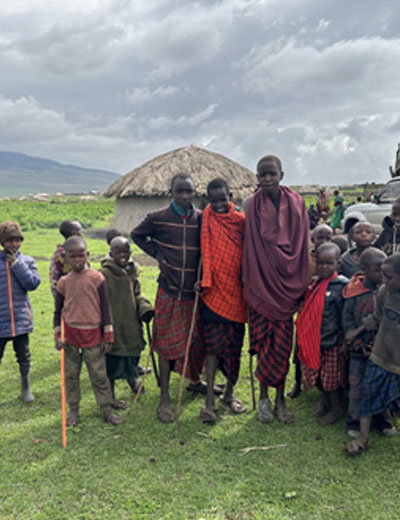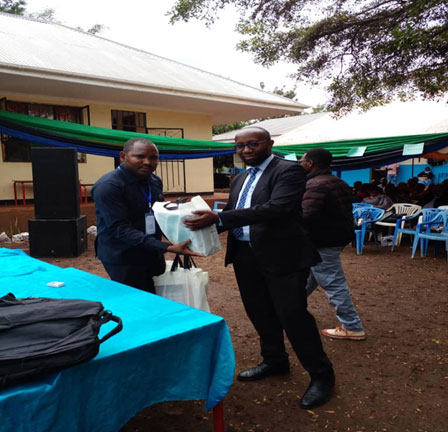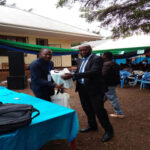Intergrated Educational
Opportunities
Integrated Educational Opportunities
Situation: In Africa, particularly in Tanzania, many children’s lives are jeopardized by poverty, illness, poor nutrition, and illiteracy. ALMASI supports children in school, providing pre-school facilities and the right education required, and advocating for funding for children’s issues. Many children in Maasai communities go to elementary school without going through pre-school education. This increases the burden at the school since none of pupils had a pre-school education and most of them could not speak other languages like Swahili and English, which are the official learning languages in Tanzania.
- Focus area 1: ALMASI promotes the availability of pre-school facilities organized in each sub-village to make sure that children are well prepared before joining grade one (Pre-School). The same is happening now in some villages, but they lack important facilities like a special building/shed to facilitate the learning, lack of dedicated teachers to institute the required education for the early school level and teaching resources. For this program to be successful, ALMASI aim to recruit and train community members who attained secondary education to be teachers for the established pre-schools. This will ensure sustainability and avoid recruiting teachers from other communities or towns who do not always stay long because of the hard environment and language barrier.
- Focus area 2: ALMASI believes that a girl who receives education is more likely not to be affected by harmful traditions like early marriage, female genital mutilation (FGM), lack of nutrition, and this support their families later in life. This program assists girls to pursue their aspirations by offering scholarships, books and learning facilities like library, books, and access to education.
- Focus area 3: Self-awareness campaigns include identifying emotions, accurate self-perception, recognizing strength and weaknesses, acquiring strong self-confidence, and possessing self-efficacy
- Focus area 4: ALMASI work to end domestic violence against women by undertaking awareness and campaigns about the effect of domestic violence, advocating to affect public policies, and providing educational resources through school clubs and peer-to-peer discussion or debates at school.
ALMASI believes that when a girl understands her rights, she can be an agent of change, for herself, others, and her community in general.
Moringe Parkipuny Education Fund (MPEF) problem statement: Girls in Africa, particularly in Tanzania, struggle to attain an education. The barriers are the underlying culture and traditions that undermine the development of girls and women in general. The program aims to bring awareness of the importance of women and girls within the community. Lack of access to essentials like clean water and health care, barriers to education and employment, early child marriage, and domestic violence all create environments where it is difficult for a girl to succeed. ALMASI serves children by working with local organizations, governments, and the private sector to develop strategies of how to emancipate women, girls, and children out of poverty.
Due to the unconducive environment for girls, MPEF will establish a center that prepares girls before heading to secondary school. This means that girls will be recruited after their completion of standard seven (middle School) and be retained for one year at the center. They will be trained well on all matters pertaining girls and how to fit into secondary education, and this will help them to avoid pregnancies at home, which is a huge problem as it is unsecure for girls to live within their communities and attend school at the same time. Girls will be allowed to go home only for vacations. The program covers not only school fees but also associated costs, ensuring that students have all the materials needed for educational success.
Moringe Parkipuny Education Fund (MPEF) Scholarship: MPEF will grant Scholarships for those bright and talents boys and girls who passed well their Grade 7 National exams but lack financial capability to further studies.
Lazaro Moringe Parkipuny (YassP’s father and a father-in-Law to Lazaro Mathayo, Founders of ALMASI) is the first Ngorongoro constituency member of parliament. He devoted his life for Maasai community. Moringe Ole Parkipuny, a long-time Maasai activist and member of the Tanzanian Parliament, was the first African to address the United Nations Working Group on Indigenous Populations in Geneva, Switzerland. In 1992 he founded a School by the name “Emanyata”. The school was originally designed to offer Maasai students an opportunity for education while retaining traditional values and a focus on pastoralism and agriculture. This Program is in his dedication.
Food Security and Climate change.
A semi-nomadic tribe in situated in Kenya and Tanzania, in East Africa. The Maasai are endangered and facing extinction because of climate change and its severe effects. It is noticeable that water and green pastures are diminishing, and several livestock disease have increased and killed livestock massively. After many years of extended dry seasons, exacerbated by climate change, an extensive and prolonged drought in this part of the world will make this noble tribe and its livelihood disappear.
The Maasai are a noble and honorable people who, despite the pressures of the modern world, have proudly maintained their traditional lifestyle and cultural identity. The Maasai culture and barter economy is built upon traditional pastoralism, and now the livestock that sustains their traditional way of life has begun dying off in alarming numbers.
ALMASI works to add to the situation by creating strategies in how to use livestock as an asset and business as a best way to tackle the current situation, which is not sustainable. This requires a strong mindset shift and attitude change. This can be accomplished through introduction of income generating activities using livestock as a source of capital and even more by promoting income diversification and avoiding dependence on livestock for survival.
Energy and sustainable development
It a notable challenge to live without electricity. The Maasai community depends on kerosene, which is a precious commodity within the community. Getting it is a challenge since it is only sold in small towns. Lighting a home with kerosene can be dangerous, and it is linked to lung cancer, pneumonia, chronic obstructive pulmonary disease (COPD), and heart disease. Communities have no other means than staying dark or using kerosene to provide light which proved to have health effects. Apart from lighting, cooking can be time consuming. Most of the energy used for cooking comes from firewood. It is a responsibility of women to collect firewood and use it to cook. The use of firewood has a detrimental effect to the environment, and it is not sustainable since it affects the environment.
ALMASI works toward universal access to clean fuel and technologies through Sustainable Development Goal on energy (SDG 7). Attaining this goal could prevent millions of deaths due to diseases and would enhance the health and well-being of communities relying on dangerous and polluting technologies — thus providing the best sustainable, simple, and affordable energy as a source of fuels for cooking, heating, and lighting. This is done by promoting and stimulating entrepreneurship within the communities where ALMASI designs simple loans for the community using trusted entrepreneurs so that they can use simple technologies and sell to communities at a lower price than it is in town, while making a profit. The money received from sales are reinvested into other villages.

Objectives
Objectives
To work toward economic and social development of disadvantaged women girls, and children, individuals, groups, and communities in Tanzania.
To facilitate community healthcare development, health awareness, and health promotion campaigns in rural communities in Tanzania.
To assist in the process of social integration and personal realization of under disadvantaged children, girls, and women.
To support pastoralists through livestock transformation initiatives, livestock to market initiatives, mindset shifting, market improvements, and better prices for livestock.
To support formal education initiatives in rural areas, especially introducing Adult Literacy program and child early learning and pre-school systems in rural communities in Tanzania
To reduce dependency on one source of income and to facilitate livelihood diversification as a resilience strategy, assuring that households have an alternative source of income if a major shock like drought and subsequent loss of livestock strikes one of their income generating strategies.
To support bottom-up approaches for economic transformation through the establishment of village Banking systems (VICOBA).
News and
Updates
ALMASI envisions a community with brighter futures for women, children, families, and their communities.

ALMASI contributing to Arusha region education initiatives
Mr. Lengai Merinyo (with a tie and a white shirt), co-founder of ALMASI handing over School supplies to Arusha City Director. ALMASI was delighted to be invited to participate the event. ALMASI focus but not limited to Community education, Integrated community health...
Fundraising for the
people and cause
you care about




ACU Building Plot 30 & 31 Sokoine Road,
P.O. Box 10206, ARUSHA
USA
1 N Oplaine Rd P.O.Box 111, Gurnee IL 60031-2601

